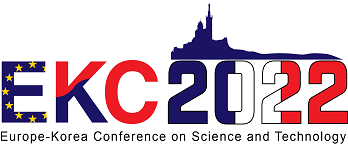PROGRAMME
Mechanical & Aerospace Engineering
The EKAMA (European-Korean Association of Mechanics and Aerospace) was founded in 2018 on the occasion of EKC 2018 held in Glasgow, UK, to assemble all Korean scientists and engineers working in Europe on Mechanical and Aerospace Engineering from the 9 associations matched to the country. One of our aims is to link all these members to buid up a Europewide network and to enhance specialized cooperations between Europe and Korea.
As the slogan of EKC 2022, Green Industry, we focus on on-going and novel green technologies for Transportations, in particular Automobiles. Moreover, the problem of noises is still reccurent, it is why we would like to treat this problem coupled with Accoustics, more generraly Vibrations.
Satellites are one of the thematics that we would like to underline, because the needs of telecommunication is exponentially growing. Korea has made an important development in this field during the last decades and EKAMA has prominent members working in this field. It could be a good opportunity to join both parts to establish strong ties.
Digital twin is one of the keypoints of Industry 4.0 combining design and manufacturing processes. All applications using numerical simulation are welcome to show today’s state of the art.
Therefore, we propose the following 6 sessions.
- Aeronautics and Mechatronics
- Numerical simulation (Digital twin)
- Future Mobility & Transportation for Zero Emission
- Machine’s noise, vibration, and acoustics
- Automotive powertrain systems
- Sustainable satellite technology and applications
Programme Committee

PROF. HAN, Woo-suck (한우석)
Ecole Nationale Supérieure des Mines de Saint-Etienne (Mines Saint-Etienne)
han@emse.fr
Show Profile| Date / Time | 2022-07-20 13:30 -- 15:00 |
|---|---|
| Room | Petit Saint Jean |
| Conveners / Chairs |
|
| Synopsis | Transport is essential to the way people, goods and services move across the world. It drives economic growth and mobility. However, transport accounts for around 20% of the world’s green-house gas emissions and is a major contributor to poor air quality. We need to ensure future transport is cleaner, efficient and sustainable. It is also essential that we understand the relative environmental performance of different technologies in the real world. EU and Korea has maintained a good partnership in terms of emission regulations in transportation sector leading World’s utmost environmental standard. Therefore, it is meaningful to prospect what can bring a big technological impact on the green house gas reduction in the future mobility and transportation between the two parties. This session addresses the challenges we face in the development of future transport and provides open discussion on next step for zero emission. |
| Speakers |
|



